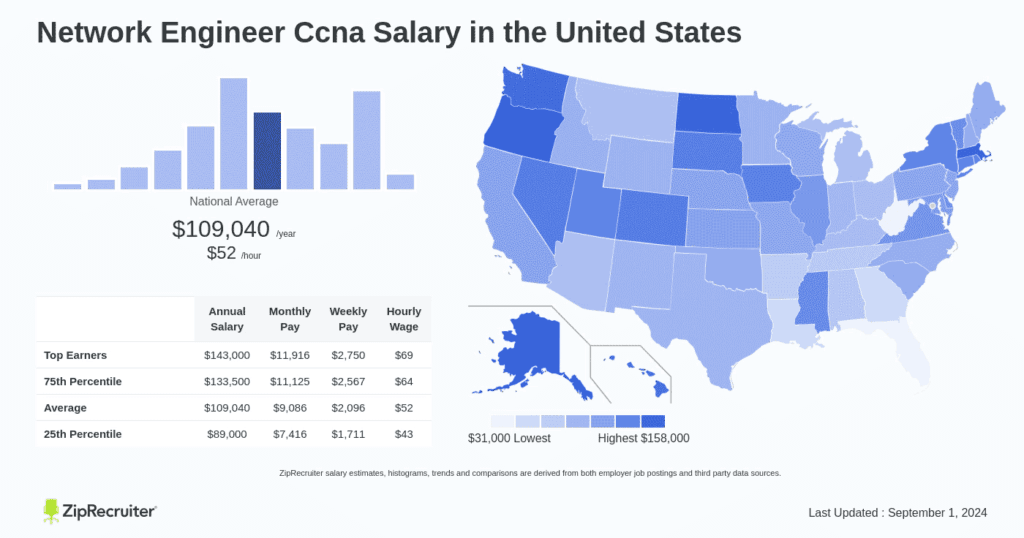The Cisco Certified Network Associate (CCNA) certification has been a staple in the IT industry for years, serving as a launchpad for networking careers. Personally, when I was first starting out in IT back in 2014, the CCNA certification was highly recommended by mentors and colleagues. It gave me the confidence to dive deep into networking concepts that I had always found intimidating. But now, in 2025, with the rapid shift to cloud solutions and network automation, is it still worth pursuing? In this guide, I’ll share not just the facts but also insights from personal experience, exploring the future relevance of CCNA and whether it’s the right certification for you.
Table of Contents
Who Should Consider CCNA?
The CCNA certification is ideal for individuals looking to start or advance their careers in IT, specifically in networking. If you are an entry-level IT professional or a student, CCNA offers a foundational understanding of network infrastructure, routing, switching, and security concepts. It’s also a good option for IT specialists looking to validate their skills or shift to roles involving network management or support.
Experienced professionals in adjacent fields—such as software development, system administration, or cybersecurity—may also consider CCNA to expand their expertise and increase career mobility. CCNA is particularly valuable for those aiming for roles like network engineer, network administrator, or systems engineer. The basics of CCNA can also help you transition to other IT fields like cloud computing.
Future Trends: The Value of Networking Skills in 2025
The future of networking is closely tied to cloud computing, SDN, and network automation, and professionals equipped with the right skills will be in demand. While some networking tasks may become automated, the need for network engineers who can manage and troubleshoot complex network systems will remain. Cisco has adapted the CCNA certification to address these changes by integrating cloud solutions and automation into the curriculum.
With businesses increasingly adopting SDN and hybrid cloud solutions, networking professionals who understand how to configure and manage networks both on-premises and in the cloud will be in high demand. According to industry reports, the global network automation market is expected to grow at a compound annual growth rate of 19.3% by 2025, showing the increasing relevance of network skills. Therefore, acquiring a CCNA certification not only provides a strong foundation for networking but also keeps you updated with future trends.
How Important is CCNA in 2025
As IT infrastructure becomes more critical to business operations, the demand for networking professionals remains strong. CCNA certification continues to be relevant in 2025 because it provides a comprehensive understanding of networking fundamentals, including IP addressing, routing protocols, VLANs, and network automation. Cisco is a dominant player in the networking industry, and being certified in Cisco technologies gives professionals a competitive edge.
Moreover, networking knowledge is required across various industries, from telecommunications to healthcare. With businesses increasingly relying on remote work solutions and cloud services, network management is evolving, but the fundamental principles remain the same, making CCNA a strong choice for professionals seeking longevity in their skills. The introduction of automation and software-defined networking (SDN) has added value to CCNA, as Cisco has updated the certification to cover these areas.
CCNA vs Other Certifications: Which Should You Choose?
When choosing a certification, it’s essential to compare CCNA with alternatives like CompTIA Network+, AWS Certified Solutions Architect, and Microsoft Azure certifications. While CCNA is focused on networking fundamentals and Cisco technologies, Network+ provides a broader overview of networking, including vendor-neutral topics. But the CCNA is more respected than the Network+ and more challenging to achieve.
If you’re specifically interested in cloud technologies, AWS or Microsoft Azure certifications might be more relevant, as they focus on the design and deployment of cloud infrastructure. However, CCNA still holds its own in industries that rely heavily on physical network infrastructure and hybrid models. Many professionals choose CCNA because it covers critical networking concepts that are applicable even in cloud-based environments.
Is CCNA Worth It for Career Switchers?
If you’re transitioning from a non-IT career with zero IT Knowledge, CCNA might not be the best certification. You might find it hard to grasp some ideas without basic IT knowledge. In this case you can start with CompTIA’s A+ certification to give you the necessary overall understanding of IT.
But if you have the basics of IT, then it can be an excellent way to pivot into the IT field. Numerous success stories exist of people transitioning into IT roles through CCNA, and with the growing demand for network administrators in a digitized world, it’s worth considering if you are planning a career change in 2025.
How Much Does CCNA Cost?
The CCNA certification costs include exam fees, study materials, and potential training programs. The exam fee is typically around $300, though discounts may be available through promotions or educational partnerships. Study materials, including books, practice exams, and lab access, can range from $50 to $500, depending on whether you opt for self-study or formal training programs.
Depending on the provider, online courses and boot camps may cost anywhere from $500 to $2,000. Overall, the investment can be as low as $400 for self-learners but may increase to $2,500 or more if additional resources and training are needed.
What Might Be the Expected Earnings for a CCNA in 2025?
In 2025, a CCNA-certified Network Engineer in the United States can expect to earn an average annual salary of $109,040. Hourly, this comes out to around $52.42, or roughly $9,086 per month. Salaries for CCNA holders range widely, with some earning as low as $31,000, while the highest reported salaries reach up to $158,000 annually. Most salaries fall between $89,000 (25th percentile) and $133,500 (75th percentile), with top earners making $143,000 per year. The salary range suggests substantial opportunities for advancement based on experience, skills, and location.
In cities like Berkeley, CA, and New York City, NY, professionals can earn significantly above the national average, with Berkeley topping the list at $132,010 annually. Location can be a critical factor, not only for higher pay but also when considering the cost of living, making relocation a potentially rewarding move for career advancement. (Source: ZipRecruiter)

Is CCNA Hard?
The CCNA exam is known for being quite challenging, especially for beginners. The difficulty comes from multiple factors, including the breadth of topics, the depth of understanding required, and the way questions are framed.
Content Scope
One of the biggest hurdles is the sheer amount of information covered. The CCNA touches on many topics, from subnetting to protocols like STP and OSPF. Many people find it overwhelming to remember everything, especially as the exam tests both theory and practical lab skills.
The Wording of Questions
Another challenge is how the questions are phrased. Many test-takers find the wording unnecessarily complex, with scenarios that can be vague or roundabout. This makes it crucial not only to know the material but to fully understand the underlying concepts.
Hands-On Labs
Practical experience is key. The CCNA requires you to be proficient in hands-on labs, and a lot of users found it easier to retain information by actually setting up and troubleshooting networks. This can be time-consuming, but it’s essential for success.
Overall, the CCNA is tough but achievable with dedication, practice, and by breaking down the content step-by-step.
What Jobs Can I Get with CCNA?
A CCNA certification can open doors to a variety of roles in the networking field. Here are some key positions along with their job descriptions:
- Cloud Engineer: Designs and implements cloud-based solutions, enabling users to access data and applications from anywhere in the world.
- Network Administrator: Oversees the day-to-day operation of a computer network, troubleshooting issues and keeping the network running smoothly.
- Infrastructure Engineer: Manages the physical components of a computer network, such as routers, switches, and cables, ensuring smooth network operation.
- Cloud Architect: Designs and implements cloud-based infrastructure, ensuring users can access data and applications globally.
- Network Design Engineer: Responsible for designing and implementing computer networks, working with clients to understand their needs and creating tailored network solutions.
- Solutions Design Engineer: Develops and implements solutions to networking problems, working closely with clients to meet their specific requirements.
- Unified Communications Engineer: Designs and implements unified communications systems, integrating communication across multiple devices like phones, computers, and tablets.
- Data Center Engineer: Manages the operation of a data center, including installing and maintaining hardware and software components.
Each role requires a unique skill set, and your choice will depend on your experience, certifications, and career goals. CCNA is an excellent starting point to pursue these opportunities.
How In-Demand Will CCNA Be in 2025?
The CCNA certification can be a valuable asset in your job search, but its effectiveness depends on various factors, such as your location, the specific job market, and your additional qualifications and experience. As of October 14, 2024, job postings seeking CCNA-certified professionals include:
| Job Portal | Number of Jobs |
| 1,590 | |
| Simply Hired | 4,224 |
| Indeed | 4,000+ |
This highlights a healthy demand for networking professionals with CCNA skills. CCNA is globally recognized and can open doors to entry-level and mid-level networking positions, especially for employers seeking candidates with a solid understanding of network infrastructure and Cisco technologies. However, it’s crucial to remember that the job market is competitive. Relying solely on a CCNA certification without additional skills, experience, or education may not be sufficient.
Is CCNA Worth It?
The CCNA (Cisco Certified Network Associate) can be a valuable certification, but it depends on your career goals and experience. Here’s a breakdown to help you decide:
It’s a strong start for network professionals:
- Opens doors: The CCNA is a recognized credential that demonstrates foundational networking knowledge. It can help you get your foot in the door for entry-level network engineer or technician roles.
- Solid foundation: The CCNA covers core networking concepts like routing, switching, and IP addressing. This knowledge is essential for any network professional.
- Salary boost: While the median salary range you mentioned (80-100k) might vary depending on location and experience, the CCNA can potentially lead to a salary increase compared to non-certified roles.
However, consider these factors:
- Experience matters: The CCNA alone may not guarantee a high-paying job. Companies often value experience alongside certifications.
- Focus on soft skills: Communication, teamwork, and problem-solving are crucial for network professionals.
- Cloud focus is increasing: Cloud technologies like AWS and Azure are gaining traction. Consider supplementing your CCNA with cloud certifications relevant to your desired career path.
So, is the CCNA worth getting in 2025?
Yes, for those looking to enter the networking field, the CCNA remains a valuable starting point. However, combine it with relevant experience and consider pursuing additional certifications to stay competitive in the evolving IT landscape.



